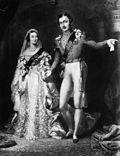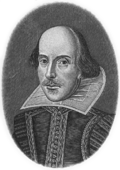Portal:United Kingdom
The United Kingdom Portal
 |
 |

| |
The United Kingdom of Great Britain and Northern Ireland, commonly known as the United Kingdom (UK) or Britain, is a country in Northwestern Europe, off the coast of the continental mainland. It comprises England, Scotland, Wales, and Northern Ireland. The UK includes the island of Great Britain, the north-eastern part of the island of Ireland, and most of the smaller islands within the British Isles, covering 94,354 square miles (244,376 km2). Northern Ireland shares a land border with the Republic of Ireland; otherwise, the United Kingdom is surrounded by the Atlantic Ocean, the North Sea, the English Channel, the Celtic Sea, and the Irish Sea. The UK maintains sovereignty over the British Overseas Territories, which are located across various oceans and seas globally. The United Kingdom had an estimated population of over 68.2 million people in 2023. The capital and largest city of both England and the United Kingdom is London. The cities of Edinburgh, Cardiff, and Belfast are the national capitals of Scotland, Wales, and Northern Ireland, respectively.
The UK has been inhabited continuously since the Neolithic. In AD 43, the Roman conquest of Britain began; the Roman departure was followed by Anglo-Saxon settlement. In 1066, the Normans conquered England. With the end of the Wars of the Roses, the English state stabilised and began to grow in power, resulting by the 16th century in the annexation of Wales, and the establishment of the British Empire. Over the course of the 17th century, the role of the British monarchy was reduced, particularly as a result of the English Civil War. In 1707, the Kingdom of England and the Kingdom of Scotland united under the Treaty of Union to create the Kingdom of Great Britain. In the Georgian era, the office of prime minister became established. The Acts of Union 1800 incorporated the Kingdom of Ireland to create the United Kingdom of Great Britain and Ireland in 1801. Most of Ireland seceded from the UK in 1922 as the Irish Free State, and the Royal and Parliamentary Titles Act 1927 created the present United Kingdom.
The UK became the first industrialised country and was the world's foremost power for the majority of the 19th and early 20th centuries, particularly during the Pax Britannica between 1815 and 1914. The British Empire was the leading economic power for most of the 19th century, a position supported by its agricultural prosperity, its role as a dominant trading nation, a massive industrial capacity, significant technological achievements, and the rise of 19th-century London as the world's principal financial centre. At its height in the 1920s, the British Empire encompassed almost a quarter of the world's landmass and population, and was the largest empire in history. However, its involvement in the First World War and the Second World War damaged Britain's economic power and a global wave of decolonisation led to the independence of most British colonies. (Full article...)
Featured article
The Tower of London is a historic castle on the north bank of the River Thames in central London, England. It lies within the London Borough of Tower Hamlets, separated from the eastern edge of the City of London by the open space known as Tower Hill. It was founded in 1066 as part of the Norman Conquest of England. The White Tower, which gives the entire castle its name, was built by William the Conqueror in 1078, and was a resented symbol of oppression, inflicted upon London by the new ruling elite. Since at least 1100, the castle has been used as a prison, although that was not its primary purpose. The Tower of London has played a prominent role in England's history. It was besieged several times and controlling it has been important to controlling the country. The Tower has served variously as an armoury, a treasury, a menagerie, the home of the Royal Mint, a public records office, and the home of the Crown Jewels of the United Kingdom. The zenith of the castle's use as a prison came in the 16th and 17th centuries, when many figures fallen into disgrace, such as Elizabeth I before she became queen, were held within its walls. Today the Tower of London is a popular tourist attraction. It is cared for by the charity Historic Royal Palaces and is protected as a World Heritage Site. (Full article...)
Featured biography
J. R. R. Tolkien was a British writer and university professor and is best known as the author of The Hobbit and The Lord of the Rings. He was a professor of Anglo-Saxon language at Oxford University from 1925 to 1945, and of English language and literature, also at Oxford, from 1945 to 1959. He was a strongly committed Roman Catholic. Tolkien was a close friend of C. S. Lewis, with whom he shared membership in the literary discussion group the Inklings. In addition to The Hobbit and The Lord of the Rings, Tolkien's published fiction includes The Silmarillion and other posthumously published books about what he called a legendarium, a connected body of tales, fictional histories, invented languages, and other literary essays about an imagined world called Arda (Middle-earth), and Middle-earth. Most of these works were compiled from Tolkien's notes by his son Christopher Tolkien. The enduring popularity and influence of Tolkien's works have established him as the "father of modern fantasy literature". Tolkien's other published fiction includes stories not directly related to the legendarium, some of them originally told to his children. (Full article...)
General images -
Subportals
WikiProjects
Things you can do
- Visit the British Wikipedians' notice board.
- The noticeboard is the central forum for information and discussion on editing related to the United Kingdom.
- Comment at the British deletion sorting page.
- This page lists deletion discussions on topics relating to the United Kingdom.
Featured pictures
Did you know -

- ... that Liz Shore's nomination to be Chief Medical Officer of the United Kingdom was vetoed by Margaret Thatcher because of Shore's husband's political affiliation?
- ... that New Zealand composer Maewa Kaihau sold her rights to the song "Now is the Hour" for £10, a decade before it became a hit in the United Kingdom and United States?
- ... that Joanna Cherry showed a printed copy of an Internet meme featuring Lily Hoshikawa during a UK parliamentary committee meeting?
- ... that neighboring British Sierra Leone and Liberia disputed their border, and the British Empire seized the disputed territory in 1885?
- ... that the 1st Armoured Division of the British Army chose a white rhinoceros on a black oval as their insignia?
- ... that before Fred Thomas became an MP, he was the Royal Marines' light heavyweight boxing champion?
In the news
- 7 April 2025 –
- The first birth of a baby in the United Kingdom to a person with a transplanted womb is announced. The baby girl, delivered at Queen Charlotte's and Chelsea Hospital in London to a 36-year-old woman, is reported to be healthy. (BBC News)
- 5 April 2025 – Tariffs in the second Trump administration, Executive orders in the second presidency of Donald Trump
- UK-based multinational car manufacturer Jaguar Land Rover suspends vehicle exports to the United States for a month to evaluate the impact of Trump's tariffs on the automotive industry. (Fox Business)
- 5 April 2025 – Israel–United Kingdom relations
- Israel blocks two British Labour Party MPs from entering the country. (Reuters)
- 3 April 2025 – Tariffs in the second Trump administration
- A 25% tariff on all automotive imports into the United States enters force. No exemptions are announced despite requests from several major trade partners, including Japan and the United Kingdom. (Reuters)
- 27 March 2025 –
- British environmental activist group Just Stop Oil announces they will end all civil resistance, direct action, and vandalism-related protests immediately and disband by April 26 after the British government announced it will halt the granting of new oil and gas permits. (DW) (Government of the United Kingdom)
- 24 March 2025 – United Kingdom cost-of-living crisis
- British supermarket chain Morrisons announces that it will permanently close 52 cafés and 17 stores as part of cost-cutting measures, with the loss of at least 365 jobs expected. (BBC News)
Categories
Other UK-connected Wikipedias
Wikimedia
The following Wikimedia Foundation sister projects provide more on this subject:
-
Commons
Free media repository -
Wikibooks
Free textbooks and manuals -
Wikidata
Free knowledge base -
Wikinews
Free-content news -
Wikiquote
Collection of quotations -
Wikisource
Free-content library -
Wikiversity
Free learning tools -
Wikivoyage
Free travel guide -
Wiktionary
Dictionary and thesaurus
























































































































